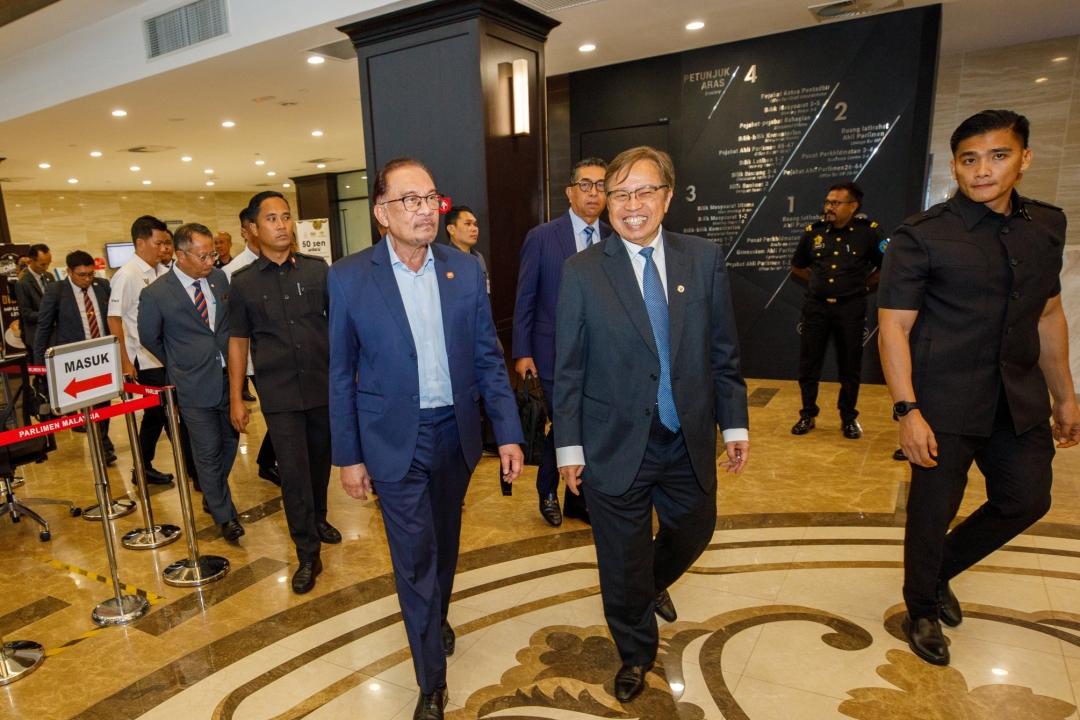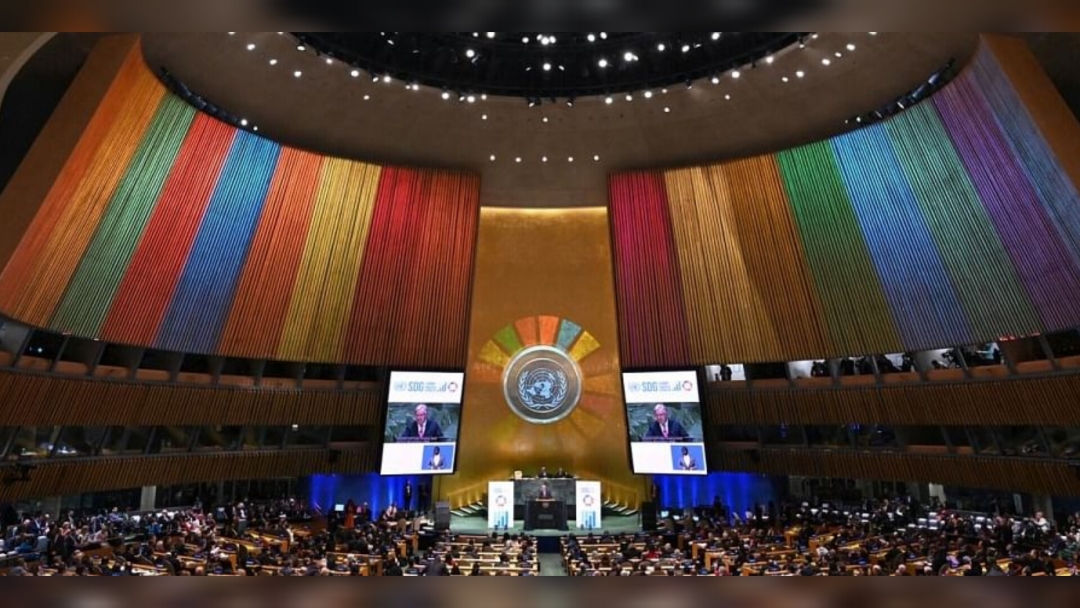
(Front, from left) Anwar and Abang Johari seen at the lobby of the Parliament Building in Kuala Lumpur, after attending the National SDG Council Meeting for 2023. — Ukas photo
at of sustainable development is resonating louder than ever in Sarawak, with Year 2023 marking a pivotal moment of 24 local governments and councils across the state actively charting their course guided under the Sustainable Development Goal (SDG) Cities Roadmap.
This ambitious and meticulously-designed plan seeks to achieve the 17 SDG Goals and 169 targets set forth by the United Nations (UN), with the Local Government Development Minister Nga Kor Ming, a staunch advocate for such transformative change, having affirmed the government’s unwavering commitment to this initiative.
In a groundbreaking move, Nga had declared it mandatory for all local governments and councils across Malaysia to embark on the SDG Cities Roadmap, signalling a nationwide shift towards sustainable urban development.
“I was informed that out of 155 local councils in the country, 45 have already embarked on their SDG Cities Roadmap to achieve the 17 SDG Goals and 169 targets. Six of them have submitted their ‘Voluntary Local Review’ report of progress to the UN, and 24 of the 45 are in Sarawak.
“In 2024, we will have an additional 20 local authorities that have agreed and committed to the preparation of the SDG city roadmap,” the federal minister said in his speech for the ‘Malaysia SDG Cities Network and World Habitat Day’ launch, held in conjunction with the 2023 Malaysia Urban Forum, at the Hikmah Exchange Events Centre in Kuching on Nov 6.

Nga (centre) leading the gimmick launch for Malaysia SDG Cities Network and World Habitat Day at the Hikmah Exchange Events Centre in Kuching. Also with him on stage are Sarawak Deputy Minister II for Public Health, Housing and Local Government Datuk Michael Tiang (right) and Kuching North Datuk Bandar Hilmy Othman (second left). — Photo by Roystein Emmor
The SDGs, often revered as the ‘Global Goals’, were adopted by the UN in 2015 means as a universal call to action, aiming to eradicate poverty, safeguard the planet, and ensure global peace and prosperity by 2030.
The interconnectedness of these goals is emphasised through the integration of the 17 objectives that recognise the ripple effect of actions across social, economic and environmental realms.
During the event in Kuching, Nga highlighted the significance of empowering local stakeholders, enabling them to align projects with global and national goals.
He also hailed such empowerment is being vital, allowing Malaysian cities to forge unique pathways, addressing local challenges with a sense of responsibility.
Moreover, Nga stressed the importance of a bottom-up feedback system, fostering integration and cooperation on policy matters. The aim was to promote better coordination of action plans, ensuring alignment with real needs and plans on the ground.
On Nov 7 this year, Prime Minister Datuk Seri Anwar Ibrahim announced the establishment of SDG indicator targets, and finalised the nine accelerator initiatives.
These initiatives would seamlessly integrate into Phase 2 of the SDG Roadmap, set to be published imminently.

The UN has established the 17 SDGs to confront diverse global challenges spanning social, economic and environmental realms and these goals have the overarching aim of fostering sustainable development and enhancing the well-being of both people and the planet. — AFP photo
Chairing the National SDG Council Meeting for 2023, Anwar emphasised the imperative of effective SDG implementation to achieve the 2030 Agenda for Sustainable Development.
Sarawak Premier Datuk Patinggi Tan Sri Abang Johari Tun Openg, who was among the leaders attending the 2023 National SDG Council meeting held at the Parliament Building in Kuala Lumpur, said the meeting also touched on balanced economic development.
It also discussed poverty and renewable energy, while the UN Commissioner also mentioned what Sarawak was doing from the point of renewable energy as well.
“In development, we take into account what has been mentioned by the UN regarding the sustainability programme,” Sarawak Public Communications Unit (Ukas) had quoted Abang Johari as saying at the meeting, also mentioning that the meeting discussed the SDGs under the matters monitored by Malaysia and the UN.

The headquarters of the Kuching North City Commision stands tall atop Bukit Siol in Petra Jaya, Kuching. Out of 155 local councils in Malaysia, 45 have already embarked on their SDG Cities Roadmap and from the 45, 24 are in Sarawak.
The report, made by Ukas following the meeting, said the SDGs were being implemented in three phases according to the national development plan, starting with the 11th Malaysia Plan (11MP-2016-2020) and currently under the 12th Malaysia Plan (12MP-2021-2025), and would continue in the 13th Malaysia Plan (13MP-2025-2030).
The country’s SDG progress reporting is carried out every four years, in line with the UN’s recommendation for the report to be presented periodically through the National Review Report (VNR).
The UN has established the 17 SDGs to confront diverse global challenges spanning social, economic and environmental realms and these goals have the overarching aim of fostering sustainable development and enhancing the well-being of both people and the planet.
Accompanying each goal are specific targets, totalling 169 across the entire set and are universally adopted by all UN member states in 2015 as part of the 2030 Agenda for Sustainable Development.

Participants of a city walk programme make their way out of the compound of Kuching South City Council at Jalan Padungan in Kuching, during the Kuching Car-Free Morning 2.0, held in October.
The SDGs encompass a broad scope of objectives and they include ending poverty, achieving food security, promoting health, ensuring quality education, attaining gender equality, managing water resources sustainably, providing access to clean energy, fostering economic growth, building resilient infrastructure, reducing inequality, creating sustainable communities, promoting responsible consumption, addressing climate change, conserving marine and terrestrial ecosystems, fostering peace and justice, and strengthening global partnerships.
Recognising the intricate interconnections between these goals and targets, they collectively form a comprehensive framework for addressing multifaceted global challenges such as poverty, inequality, environmental sustainability and peace.

